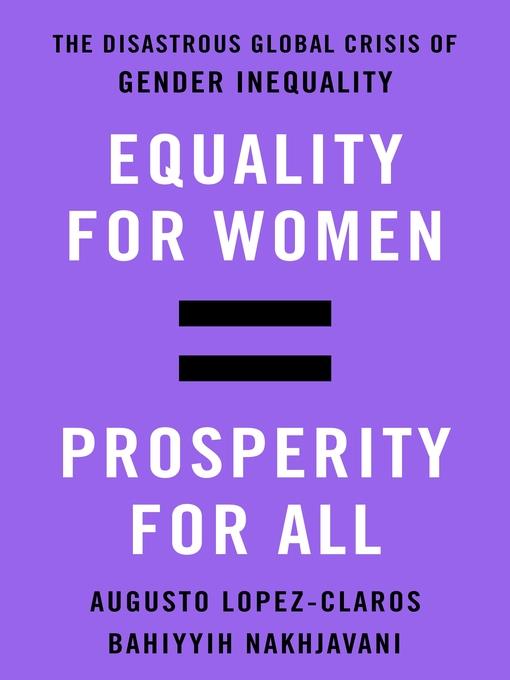
Equality for Women = Prosperity for All
The Disastrous Global Crisis of Gender Inequality
- اطلاعات
- نقد و بررسی
- دیدگاه کاربران
نقد و بررسی

July 30, 2018
In this convincing collaboration, World Bank economist Lopez-Claros and novelist Nakhjavani (The Woman Who Read Too Much) argue that the costs of denying women equal opportunities for health, education, legal protection, and employment are “just too high to pay any longer.” From an economic standpoint that views women as human capital and gender inequality as “a waste of human resources,” the authors demonstrate that full human rights for women is not only a moral and political issue but also “an issue of economic efficiency.” They draw on hard-hitting statistics to illustrate the “female deficit” in the world population (in 2015, “there were some 101.6 males for every 100 females”), the lost productivity due to violence against women, and the numerous economic indicators that improve when women are granted equal voice and pay in the workplace (the authors note that according to research consultancy MSCI, companies with women on boards are “correlated with higher return on equity than companies without such leadership”). Practical, intelligent, and focused on solutions (“Whenever mothers are educated, there is a higher probability their daughters will be too”), this book combines sound research across several disciplines to prove the simple math of its title and make the pressing case that governments should prioritize gender equality for reasons of economic stability if nothing else.

August 15, 2018
An economist and a novelist team up to show that when women don't flourish, neither does the GDP.Drawing in part on data from the World Bank's Women, Business and the Law project, Georgetown School of Foreign Service senior fellow Lopez-Claros, the former director of Global Indicators at the World Bank and chief economist at the World Economic Forum, and Nakhjavani (Us&Them, 2017, etc.) argue that discussions of sexism must take economics into account, because the actual "price we are paying for inequality is too high." With almost overwhelming force, the authors demonstrate the widespread persistence of gender inequality. As they note, in more than a dozen countries, husbands can legally prevent women from accepting paid employment; in Africa and South Asia, too few girls attend secondary school; and nearly 40 percent of people surveyed in 60 countries over four years agree that, when jobs are scarce, men should have more rights to paid employment than women. Lopez-Claros and Nakhjavani go on to demonstrate the economic consequences of inequality. For example, violence against women is commonplace, and female victims have diminished economic productivity. What's to be done? Some of the authors' conclusions are unsurprising--e.g., women who have control over reproduction have greater career choice. In their attempt to address religiously motivated gender discrimination, the authors blandly and patronizingly suggest that "perhaps the time has come to distinguish between the universal principles in all faiths and the cultural mirages we elevate to the level of religious doctrine." They are more persuasive--and more energizing--when they offer specific policy ideas, such as the suggestion that state-sponsored pensions and health care could reduce "gendercide." As they point out, the belief that sons are necessary protections against the economic ravages of aging often animates couples' preferences for sons (and their practice of sex-selective abortion).Impressive in scope and alternately inspiring and depressing.
COPYRIGHT(2018) Kirkus Reviews, ALL RIGHTS RESERVED.

October 1, 2018
The unequal treatment of women stifles the development of nations as much as women. Economics scholar Lopez-Claros joins Iranian author Nakhjavani to examine how laws restricting women and the misallocation of resources to favor men have had disastrous effects on the economies of many nations. They explore history and traditions from the mid-nineteenth century to today and present examples of inequality that have resulted in endemic poverty, violence, and social instability. Inequality can be as subtle as dispersal of misinformation and suppression of critically important information in the guise of love and protection of women. It is also as brutal as laws and customs that severely limit women's autonomy. Whether nuanced or codified, these practices have fostered the concentration of family wealth with males and preferences for sons, which have resulted in the aborting or killing of baby girls. The authors compare the economies of gender-biased nations to those that promote equal rights, demonstrating the profound impact of inequality. The bottom line: When men walk in partnership with women, it is to their own advantage. When they do not, economies fail. (Reprinted with permission of Booklist, copyright 2018, American Library Association.)




دیدگاه کاربران